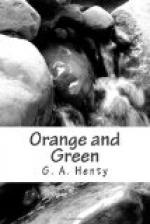Schomberg was soon joined by three regiments of Enniskillen horse. The appearance of these troops astonished the English. They resembled rather a horde of Italian banditti than a body of European cavalry. They observed little order in their military movements, and no uniformity of dress or accoutrement. Each man was armed and clad according to his own fancy, and accompanied by a mounted servant, carrying his baggage. But, like the Cossacks, whom they closely resembled, they were distinguished by an extreme rapidity of movement, and a fierceness and contempt of all difficulty and danger. They calculated neither chances nor numbers, but rushed to the attack of any foe with a ferocity and fanaticism which almost ensured success, and they regarded the slaughter of a Papist as an acceptable service to the Lord. They plundered wherever they went, and were a scourge to the Irish Protestants as well as Catholics.
The troops furnished by Derry were similar in character to those from Enniskillen. They could not endure the restraints of discipline, and were little use in acting with the regular army, and, like the Cossacks, were formidable only when acting by themselves. Schomberg and his successor, and, indeed, the whole of the English officers, soon came to abhor these savage and undisciplined allies.
Still, the Irish army made no move. Report had magnified Schomberg’s strength to more than twice its real numbers, and the military leaders could not believe that, after so many months of preparation, William had despatched so small an army for the conquest of Ireland.
Confusion and dismay reigned in Dublin. The French Marshal, De Rosen, advised that Dublin and Drogheda should be abandoned, and that the Irish army should be concentrated at Athlone and Limerick; but Tyrconnell went to Drogheda, where the council of war was sitting, and strenuously opposed this, promising that by the next night twenty thousand men should be assembled there. Expresses were sent out in all directions; and by forced marches, the Irish troops stationed in Munster directed their course to Drogheda, in high spirits and anxious to meet the enemy.
Schomberg, although he had been reinforced by six thousand men from England, fell back at the news of the gathering, and formed an intrenched camp in a strong position between Dundalk and the sea. His approaches were covered by mountains, rivers, and morasses; his communication was open to the sea, and here he resolved to wait for reinforcements.
Captain Davenant became more and more despondent as to the cause in which he had embarked.
“Without the king, and without his French allies,” he said bitterly to his wife, “we might hope for success; but these are enough to ruin any cause. Were the king’s object to excite discontent and disgust among his subjects, he could not act otherwise than he is now doing. His whole thoughts are devoted to wringing money out of the people, and any time he has to spare is spent upon superintending the building of the nunneries, in which he is so interested. As to the French, they paralyse all military operations. They regard us as an inferior race, and act as if, with their own five or six thousand troops, they could defeat all the power of England. It is heartbreaking seeing our chances so wasted.




